

Is ChatGPT the beginning of the end for search engines?
source link: https://uxdesign.cc/is-chatgpt-the-beginning-of-the-end-for-search-engines-359da42388db
Go to the source link to view the article. You can view the picture content, updated content and better typesetting reading experience. If the link is broken, please click the button below to view the snapshot at that time.
Is ChatGPT the beginning of the end for search engines?
How Elon Musk’s new AI chatbot could be calling for a redesign of Google and other search engine powerhouses
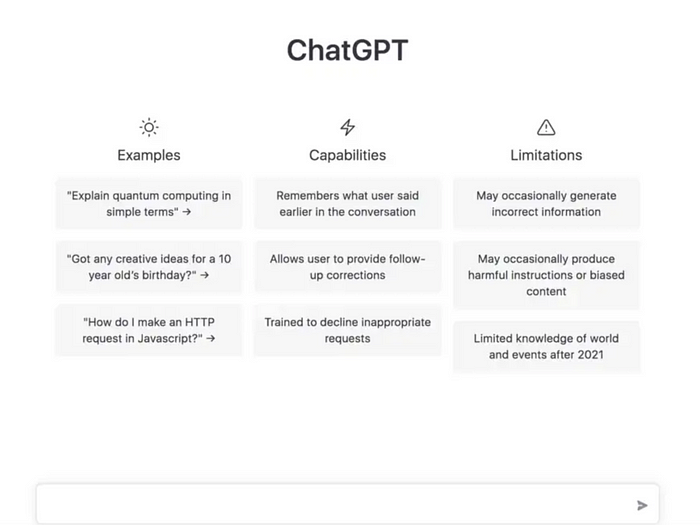
ChatGPT had one million users within five days of its November release. (Photo by Openai.com)
In the latest of the AI-makes-us-all-look-like-total-idiots saga, the internet has been stumped over ChatGPT and what exactly the platform can’t do.
The chatbot has even caught the attention of the New York Times who featured this tweet in its most recent article about ChatGPT and all its strange functions:
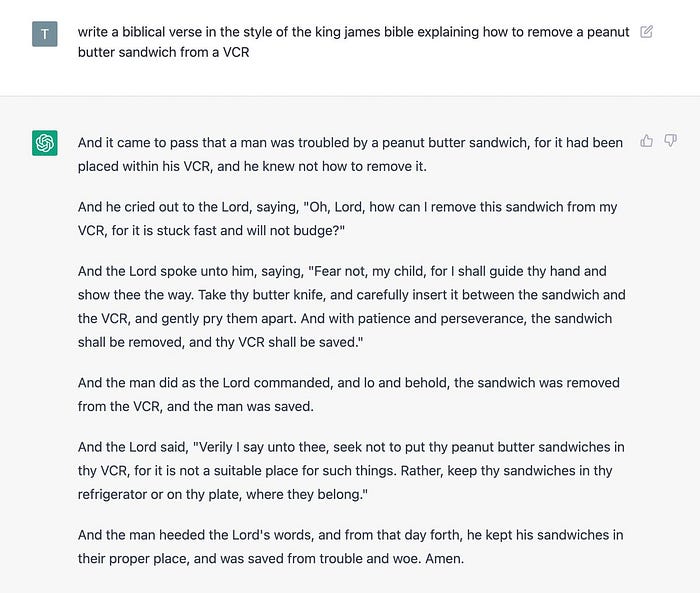
One of the millions of personalized requests by users to ChatGPT (Photo by The New York Times)
So, what is ChatGPT?
In the words of ChatGPT itself:
GPT, or Generative Pre-trained Transformer, is a type of artificial intelligence model that is used for generating human-like text. It was developed by OpenAI and has been trained on a large dataset of human-generated text, allowing it to generate text that is similar in style and content to the text it was trained on.
GPT has been used in a variety of applications, including chatbots, language translation, and text summarization. It is a type of language model, which means it is designed to predict the next word in a sequence of text given the context of the words that come before it. This allows it to generate coherent and coherently structured text.
In the context of chatbots, GPT can be used to generate responses to user input, allowing the chatbot to have more natural and engaging conversations with users. It can also be used to generate content for chatbots to send to users, such as news articles or personalized recommendations.
While ChatGPT is able to produce content in seemingly record-breaking time, it may not have gotten conciseness down yet.
The key takeaway here is that ChatGPT is a language model that predicts the next word in a sentence or phrase based off the context of previous words, generating responses to user requests that are meant to be natural and conversational.
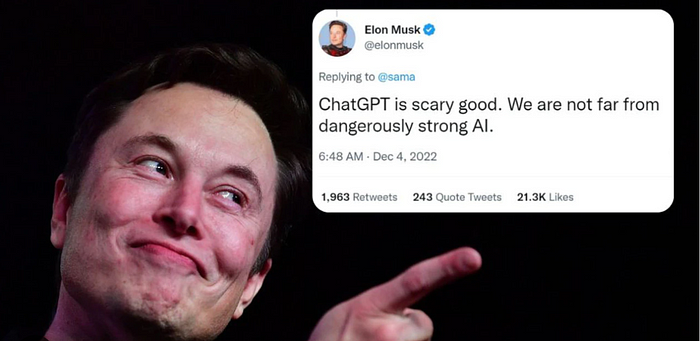
Elon Musk even called the system “scary good” — having been one of the original founders back in 2015. (Photo by news.com.au)
In addition to answering questions, ChatGPT can do things like:
- writing code or essays,
- generating AI prompts,
- and iterating on its responses given feedback.
This raises the question: is there a need for technology to sift through academic work to see if students are using AI to do their homework for them?
Ethics aside, the buzz over ChatGPT is leading people to wonder if Google and other search engines should be worried.
Advantages of ChatGPT
The most obvious advantage of ChatGPT is its self assessment of providing natural and engaging conversations.
Take this for example. I asked both Google and ChatGPT the same question:
What drink can I make with elderflower liqueur and champagne?
Google’s response:
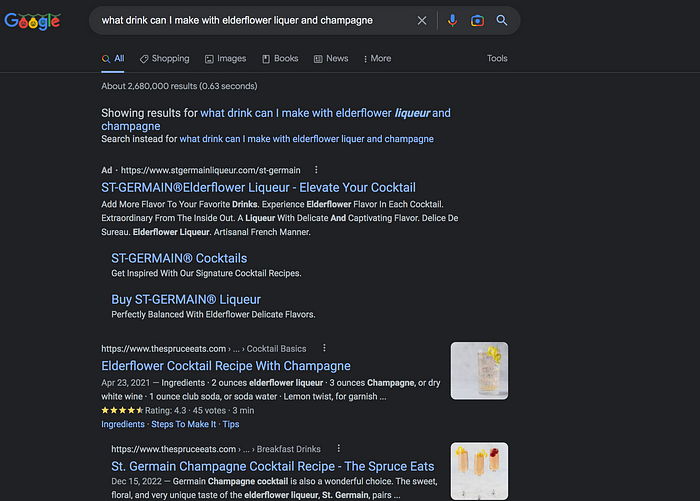
(Photo from Google)
ChatGPT’s response:
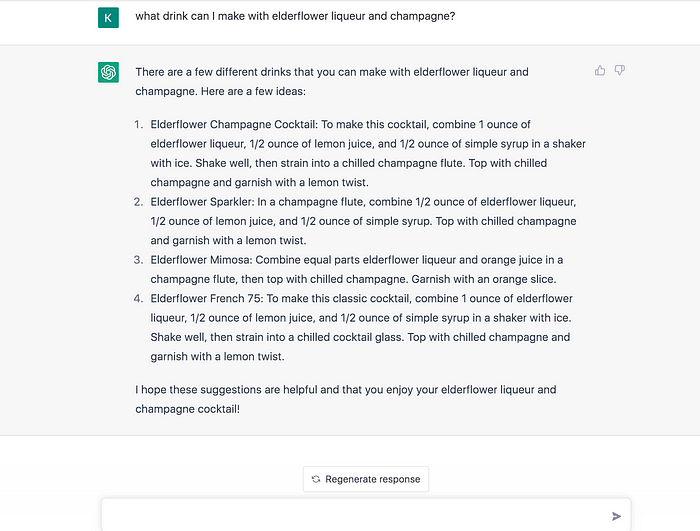
(Photo from OpenAi.com)
Notice that with ChatGPT, I’m able to find the information I want without needing additional clicks. I’m also a lot less overwhelmed: Google presents me with over 2 million results littered with ads, whereas ChatGPT filters it out into four simple options to choose from.
And if I’m not satisfied with the options presented, I’m able to click the “Regenerate response” feature to find more recipes.
ChatGPT also feels a lot more conversational. Rather than providing content written by millions of creators, ChatGPT has one output which makes me feel like I’m speaking with the same person every time I ask a question.
Blind spots
While ChatGPT is surely the most advanced of its kind, it hasn’t yet matured to dethrone Google.
One of the biggest blind spots of ChatGPT is a lack of ethos. Whereas its pretty easy to find the source of information in a Google search, as a user you’re not entirely sure what is informing ChatGPT and whether or not the information its presenting is correct.
Because of ChatGPT’s predictive text model, and its ability to feed off user content, it’s much more prone to providing false information.
Additionally, ChatGPT isn’t quite up-to-date. The chatbot is limited to information it acquired before 2021, so in more ways than one it’s due for a rude awakening:

(Photo from OpenAI.com)
Despite the flaws of the program, it serves as an example of the ongoing evolution of personalization in technology. Whereas Google search may learn to know you and your internet habits, it feels like sifting through the public library encyclopedia in comparison to ChatGPT.
The tech industry is experiencing an explosion of personality and products implementing more human-centered design intended to pique our interest. ChatGPT may spark a new trend in search engines presenting more conversationally than factually.
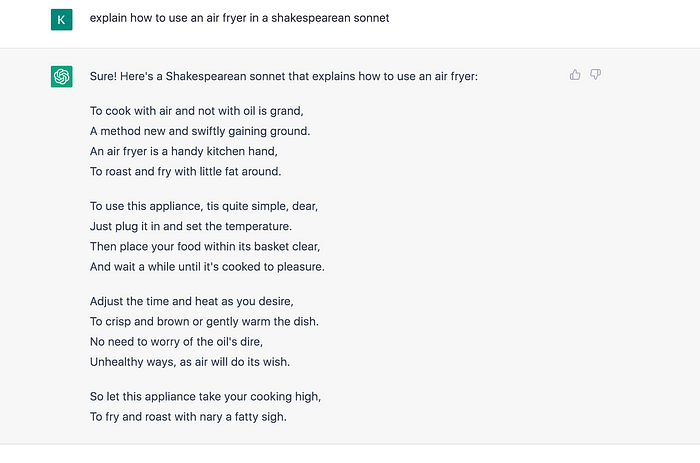
(Photo from Openai.com)
Whether or not Google reacts to these trends, and I’m guessing they will, chatbot technology is something to pay attention to.
The numbers are especially striking for new generations with increasing opportunities for companies to use chatbot technology to generate revenue.
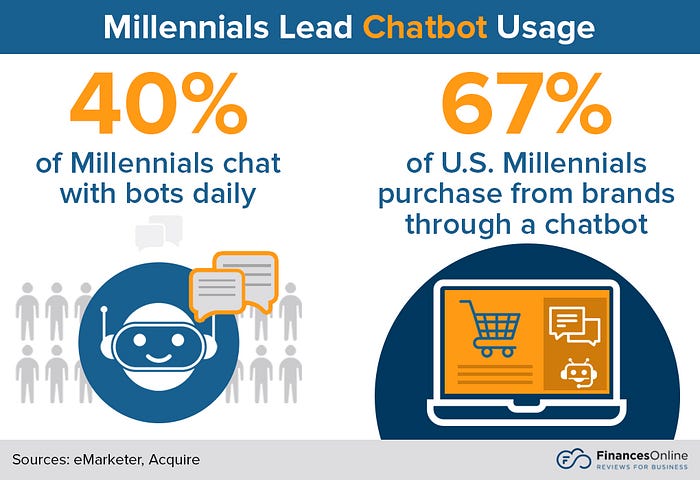
(Photo by FinancesOnline.com)
With the increasing usage of chatbots and conversational design, its likely that there will continue to be a big push for writers in tech who can help to humanize these user interactions.
Rather than viewing these technologies as a competitor, UX writers should think of ChatGPT as a platform that is as imperfect and changeable as any human. It’ll be interesting to see if these technologies are adapted as an assistive tool for writers similar to Grammarly or other online writing assistants.
For more on the topic check out:
Recommend
About Joyk
Aggregate valuable and interesting links.
Joyk means Joy of geeK